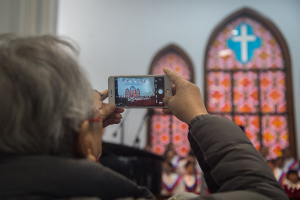Rethinking 'Date Rape'
Last fall, Emma Sulkowicz, a Columbia University student, engaged in a piece of performance art she titled "Carry That Weight," after a sexual encounter with a male student became rough and she told him to stop (which he didn't). She devised the project to illustrate the "burden" women carry after an instance of nonconsensual sex, which used to be called "date rape."
Sulkowicz did not deny previously having taken part in consensual relations with the same young man. So was this a case of rape or of miscommunication?
Recently, a media maelstrom arose over whether a young University of Virginia student was gang-raped in a frat house, with the frat's attorneys pointing to enough discrepancies in the story to necessitate a partial retraction by the Rolling Stone, which reported the story. Further reporting by the Washington Post found that a number of particulars in the case were not, and could not, be independently verified, or were outright wrong, such as whether the "attacker" was a member of a particular fraternity, and even if there was a party at that frat house the night of the alleged attack.
According to the latest statistics, one in five women on American campuses has been subject to acquaintance rape. Although the circumstances vary, one common element is that alcohol has usually been consumed by both parties.
A young adult woman, lugging a mattress – the supposed scene of a crime – around with her to class, seemed to me to crystalize all that is wrong with the current focus on the "rape culture," on college campuses and how it subsequently infantilizes adult women. I could only think of a child lugging around her security "blankie."
While the young men, every bit as immature and drunk as the young women, are excoriated and raked across society's collective coals, the young women are absolved from all liability and responsibility for their behavior.
We are not talking about mature adults preying on kids. We are talking about peers and how they think about, negotiate, and act on their sexual desires.
The Columbia student who was so outraged about being "raped" by her date, had already had consensual sex with the same young man previously. Rather than dismissing the incident as sexual communication gone wrong, instead, the young man, a student at Columbia as well, is labeled as a rapist on national TV, with no opportunity to defend himself without exposing his identity.
When does yes mean yes and no mean no?
If a woman decides that a consensual encounter is now not to her liking, and she tells the man to stop, but in a frenzy of testosterone and pleasure, he refuses, is that rape? Does her later no cancel out her earlier yes?
If a young woman, such as one profiled in the New York Times recently, gets stinking drunk at a frat party with equally drunk young men, and finds herself "taken advantage of," is that rape?
While researching this piece, I came across what I consider an excellent exploration of the issue in the New York Times by Katie Roiphe, an associate professor at the NYU School of journalism, and daughter of feminist writer Anne Roiphe.
In her piece, "Date Rape's Other Victim," Roiphe argues that the supposed culture of rape on college campuses is not an actual epidemic of rape, but a creation of perceptions about rape. In her piece, written in 1993, she says that one in four college women were reported to be victims of rape.
She writes, "I remember standing outside the dining hall in college, looking at a purple poster with this statistic written in bold letters. It didn't seem right. If sexual assault was really so pervasive, it seemed strange that the intricate gossip networks hadn't picked up more than one or two shadowy instances of rape. If I was really standing in the middle of an 'epidemic,' a 'crisis' -- if 25 percent of my women friends were really being raped – wouldn't I know it?"
She makes clear that rape does occur; often in warfare, or by a stranger, or even someone known, with whom a woman clearly hasn't consented. But the alcohol-fueled date rape epidemic on college's campuses (89 percent of such cases involve alcohol) are different. Roiphe points out how smart young women who populate campuses are seemingly embracing the discarded stereotype of a woman who does not own her own actions, who is innocent, easily persuaded and manipulated; an image that women of her mother's generation sought to dispel.
Are women really helpless victims?
In the latest controversy over Jackie's story in Rolling Stone, the writer, Sabrina Rubin Erdely, admittedly began her quest with an agenda to expose acquaintance rape on a prestigious college campus; to show how the charge is not taken seriously by college administrators (who frequently do not report the cases to police, either for fear of sullying their institution's reputations, or in recognition of the murkiness of many of the charges) and to show how young women are therefore victimized all over again.
Now I am not defending rape, acquaintance rape, date rape nor any other kind. I am saying, as Roiphe did in her piece, that cases of heterosexual miscommunication may end up as "rape," if the woman later regrets what she did; doesn't remember what she did; can't recall consenting; or did something under the influence of alcohol that she wouldn't normally do, with the attendant shame.
However, perhaps the young men also did something under the influence of alcohol that they would not normally do. Why are they held to a higher standard of accountability than the young women? Why isn't there more education on college campuses about the dangers of binge drinking? Nearly 2,000 young people a year die on American campuses of alcohol-related circumstances.
Why aren't young women taught to protect themselves and to avoid being caught in avoidable situations that could end badly, like being drunk to the point of passing out in a frat house full of horny young men suffering from TMT (too much testosterone).
Some common sense has to come into this national conversation. Hold young men accountable for violating young women sexually; hold young women accountable for putting themselves in situations this has been shown to happen. For both sexes, in the current over-sexualized popular culture, where pop idols practically make love on stage, it may be hard to know where to draw the boundaries.
As elders, we must teach the younger generation to respect themselves and their bodies enough to not get drunk to the point of loss of all self-control or loss of consciousness, and to view their sexuality as a precious and invaluable gift, as is taught by Christianity and almost every traditional faith, to be given and taken only in the context of a loving relationship.



























